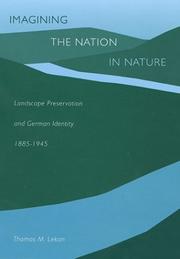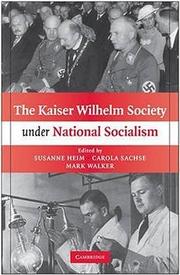| Listing 1 - 10 of 10 |
Sort by
|
Book
ISBN: 383827055X 9783838270555 3838210557 9783838210551 9783838210957 3838210956 Year: 2017 Publisher: Columbia University Press
Abstract | Keywords | Export | Availability | Bookmark
 Loading...
Loading...Choose an application
- Reference Manager
- EndNote
- RefWorks (Direct export to RefWorks)
Eugenics --- Euthanasia --- National socialism and science. --- History
Book
ISBN: 0190219491 0190219483 Year: 2015 Publisher: New York, New York : Oxford University Press,
Abstract | Keywords | Export | Availability | Bookmark
 Loading...
Loading...Choose an application
- Reference Manager
- EndNote
- RefWorks (Direct export to RefWorks)
Planck's Law, an equation used by physicists to determine the radiation leaking from any object in the universe, was described by Albert Einstein as ""the basis of all twentieth-century physics."" Max Planck is credited with being the father of quantum theory, and his work laid the foundation for our modern understanding of matter and energetic processes. But Planck's story is not well known, especially in the United States. A German physicist working during the first half of the twentieth century, his library, personal journals, notebooks, and letters were all destroyed with his home in World
Physicists --- World War, 1939-1945 --- National socialism and science. --- Physics --- Science --- History --- Planck, Max, --- Einstein, Albert, --- Family. --- Friends and associates. --- Germany --- Intellectual life

ISBN: 0521612772 0521848199 9780521612777 9780521848190 9780511617485 0511617488 9780511241963 0511241968 0511317131 9780511317132 1107164583 9781107164581 1280568135 9781280568138 9786610568130 6610568138 0511241712 9780511241710 0511240678 9780511240676 0511241194 9780511241192 Year: 2006 Publisher: New York Cambridge university press
Abstract | Keywords | Export | Availability | Bookmark
 Loading...
Loading...Choose an application
- Reference Manager
- EndNote
- RefWorks (Direct export to RefWorks)
This study provides the first comprehensive discussion of conservation in Nazi Germany. Looking at Germany in an international context, it analyses the roots of conservation in the late nineteenth century, the gradual adaptation of racist and nationalist thinking among conservationists in the 1920s and their indifference to the Weimar Republic. It describes how the German conservation movement came to cooperate with the Nazi regime and discusses the ideological and institutional lines between the conservation movement and the Nazis. Uekoetter further examines how the conservation movement struggled to do away with a troublesome past after World War II, making the environmentalists one of the last groups in German society to face up to its Nazi burden. It is a story of ideological convergence, of tactical alliances, of careerism, of implication in crimes against humanity, and of deceit and denial after 1945. It is also a story that offers valuable lessons for today's environmental movement.
National socialism and science --- Nature conservation --- Science and national socialism --- Science --- Conservation of nature --- Nature --- Nature protection --- Protection of nature --- Conservation of natural resources --- Applied ecology --- Conservation biology --- Endangered ecosystems --- Natural areas --- History --- Conservation --- Environmental protection. Environmental technology --- anno 1800-1899 --- anno 1900-1909 --- anno 1910-1919 --- anno 1920-1929 --- anno 1930-1939 --- Germany --- National socialism and science. --- Arts and Humanities
Book
ISBN: 3050094923 3050094915 3050060964 1306206693 9783050060965 9783050094915 Year: 2013 Publisher: Berlin : Akademie Verlag,
Abstract | Keywords | Export | Availability | Bookmark
 Loading...
Loading...Choose an application
- Reference Manager
- EndNote
- RefWorks (Direct export to RefWorks)
Die Erinnerung an das Reich der mittelalterlichen Könige und Kaiser nahm in der nationalsozialistischen Geschichts- und Kulturpolitik eine herausragende Stellung ein. Das Reich Karls des Großen und die Jahrhunderte der "deutschen Kaiserzeit", die Zeit der Ottonen, Salier und Staufer, galten als erste Phase "deutscher Größe" und als Vorwegnahme und historische Rechtfertigung des von den Nationalsozialisten angestrebten "großgermanischen Reiches". Von dieser völkisch-nationalistischen Deutung des Mittelalters, deren Wurzeln bis ins 19. Jahrhundert zurückreichen, blieb auch die Sicht auf die mittelalterliche Kunst nicht unbeeinflusst. Im Mittelalter wurde der Anfang "deutscher Kunst" gesucht, in der mittelalterlichen Kunst sah man einen frühen Ausdruck des deutschen Nationalcharakters, und entsprechend konnte sie sowohl als Vorbild für eine neu zu schaffende, nationale und "volksverbundene" Kunst in Anspruch genommen als auch gegen die "Entartungen" der modernen Kunst ins Feld geführt werden. Im Zentrum der Publikation steht die Praxis der Mittelalter-Kunstgeschichte im Nationalsozialismus, ihre Vorgeschichte und unmittelbare Folge. Es geht um eine Analyse der Gegenstände, Begriffe, Methoden und Deutungsmuster, mit denen mediävistische Kunstgeschichte im Nationalsozialismus operierte. Ein zweiter Themenschwerpunkt liegt auf der Popularisierung des Mittelalterbildes in Schrifttum, Film und Veranstaltungen.
National socialism and intellectuals. --- National socialism and science. --- National socialism and art --- Art, Medieval --- Middle Ages in popular culture --- Political Science --- Visual Arts --- Art, Architecture & Applied Arts --- Law, Politics & Government --- Socialism, Communism & Anarchism --- Visual Arts - General --- Socialism and art. --- Art, Medieval. --- Nazisme et art --- Art médiéval --- Moyen Age dans la culture populaire --- Congresses --- Congrès --- Medieval art --- Art and socialism --- Art
Book
ISBN: 0803246056 9780803246058 9781299535305 1299535305 0803245076 9780803245075 1496211324 9781496211323 Year: 2013 Publisher: Lincoln University of Nebraska Press
Abstract | Keywords | Export | Availability | Bookmark
 Loading...
Loading...Choose an application
- Reference Manager
- EndNote
- RefWorks (Direct export to RefWorks)
In Racial Science in Hitler's New Europe, 1938-1945, international scholars examine the theories of race that informed the legal, political, and social policies aimed against ethnic minorities in Nazi-dominated Europe. The essays explicate how racial science, preexisting racist sentiments, and pseudoscientific theories of race that were preeminent in interwar Europe ultimately facilitated Nazi racial designs for a "New Europe." The volume examines racial theories in a number of European nation-states in order to understand racial thinking at large, the origins of the Holocaust
Race --- Eugenics --- Racism in medicine --- National socialism and science --- National socialism and medicine --- Racism in anthropology --- Physical anthropology --- Homiculture --- Race improvement --- Euthenics --- Heredity --- Involuntary sterilization --- Medicine --- Science and national socialism --- Science --- Medicine and national socialism --- Anthropology --- Biological anthropology --- Somatology --- Human biology --- Research --- History --- Germany --- Third Reich, 1933-1945 --- Race relations. --- Politics and government --- Medical racism

ISBN: 0674040074 9780674040076 9780674010703 0674010701 0674010701 Year: 2021 Publisher: Cambridge, MA
Abstract | Keywords | Export | Availability | Bookmark
 Loading...
Loading...Choose an application
- Reference Manager
- EndNote
- RefWorks (Direct export to RefWorks)
One of the most powerful nationalist ideas in modern Europe is the assertion that there is a link between people and their landscape. Focusing on the heart of German romanticism, the Rhineland, Thomas Lekan examines nature protection activities from Wilhelmine Germany through the end of the Nazi era to illuminate the relationship between environmental reform and the cultural construction of national identity. In the late nineteenth century, anxieties about national character infused ecological concerns about industrialization, spurring landscape preservationists to protect the natural environment. In the Rhineland's scenic rivers, forests, and natural landmarks, they saw Germany as a timeless and organic nation rather than a recently patchworked political construct. Landscape preservation also served conservative social ends during a period of rapid modernization, as outdoor pursuits were promoted to redirect class-conscious factory workers and unruly youth from "crass materialism" to the German homeland. Lekan's examination of Nazi environmental policy challenges recent work on the "green" Nazis by showing that the Third Reich systematically subordinated environmental concerns to war mobilization and racial hygiene. This book is an original contribution not only to studies of national identity in modern Germany but also to the growing field of European environmental history. Table of Contents: Introduction 1. Nature's Homelands: The Origins of Landscape Preservation, 1885-1914 2. The Militarization of Nature and Heimat, 1914-1923 3. The Landscape of Modernity in theWeimar Era 4. From Landscape to Lebensraum: Race and Environment under Nazism 5. Constructing Nature in the Third Reich Conclusion Abbreviations Notes Sources Acknowledgments Index Writing squarely within the idiom of the 'invented tradition' and the 'imagined nation,' Thomas Lekan argues that in the wake of belated unification and at a time of rapid industrialization, the German landscape came to be seen as a touchstone of national identity. He questions the idea that those engaged in landscape preservation were simply 'antimodern,' and he challenges both scholars who have seen a straightforward continuity from pre-1933 preservationist sentiment to Nazism and those who have made exaggerated claims for the Third Reich as the progenitor of modern green politics. This is a welcome contribution to the literature on local and national identity, joining works by Celia Applegate and Alon Confino, and on the environmental history of modern Germany. Both scholarly and original, Imagining the Nation in Nature is an impressive achievement.--David Blackbourn, Harvard UniversityThis important and timely book contributes to our understanding of German identity as well as to modern concepts of environmentalism and nature. Lekan's valuable contribution elucidates the modern, technocratic, and therapeutic vision of preservation that linked Weimar and the Third Reich. His analysis of Nazi bio-nature is significant and thought-provoking.--Alon Confino, University of Virginia
Landscape protection --- Landscapes --- National socialism and science. --- Science and national socialism --- Science --- Countryside --- Landscape --- Natural scenery --- Scenery --- Scenic landscapes --- Nature --- Beautification of the landscape --- Conservation of landscapes --- Conservation of scenic beauty --- Conservation of scenic resources --- Natural beauty conservation --- Preservation of natural scenery --- Preservation of scenic resources --- Protection of landscapes --- Protection of scenic beauty --- Protection of scenic resources --- Scenery preservation --- Environmental protection --- Nature conservation --- Environmentally sensitive areas --- Landscape assessment --- Regional planning --- Social aspects --- History --- Psychological aspects --- Conservation --- Protection

ISBN: 9780511576355 9780521879064 9780521181549 0511576358 9780511534331 0511534337 052187906X 9780521879 9789780521875 0521181542 1107199298 1283331098 0511534027 9786613331090 0511532628 0511531710 0511533535 Year: 2009 Publisher: New York, NY Cambridge University Press
Abstract | Keywords | Export | Availability | Bookmark
 Loading...
Loading...Choose an application
- Reference Manager
- EndNote
- RefWorks (Direct export to RefWorks)
During the first part of the twentieth century, German science led the world. The most important scientific institution in Germany was the Kaiser Wilhelm Society, including institutes devoted to different fields of scientific research. These researchers were not burdened by teaching obligations and enjoyed excellent financial and material support. When the National Socialists came to power in Germany, all of German society, including science, was affected. The picture that previously dominated our understanding of science under National Socialism from the end of the Second World War to the recent past - a picture of leading Nazis ignorant and unappreciative of modern science and of scientists struggling to resist the Nazis - needs to be revised. This book surveys the history of Kaiser Wilhelm Institutes under Hitler, illustrating definitively the cooperation, if not collaboration, between scientists and National Socialists in order to further the goals of autarky, racial hygiene, war, and genocide.
Science and state --- National socialism and science --- Science and national socialism --- Science --- Science policy --- State and science --- State, The --- History. --- Government policy --- Kaiser Wilhelm-Gesellschaft zur Förderung der Wissenschaften. --- Kaizā Uiruherumu Gakujutsu Shinkō Kyōkai --- Kaiser-Wilhelm-Gesellschaft --- Kaizā Viruherumu Kagaku Shinkō Kyōkai --- Kaiser-Wilhelm Institute --- Kaiser Wilhelm Society --- KWG --- K.W.G. --- KWS --- K.W.S. --- Max-Planck-Gesellschaft zur Förderung der Wissenschaften --- Arts and Humanities --- History --- Kaiser Wilhelm-Gesellschaft zur Forderung der Wissenschaften.
Book
ISBN: 1000085638 3731508443 Year: 2019 Publisher: KIT Scientific Publishing
Abstract | Keywords | Export | Availability | Bookmark
 Loading...
Loading...Choose an application
- Reference Manager
- EndNote
- RefWorks (Direct export to RefWorks)
This book examines the professional life of Rudolf Greifeld, who was a managing director from 1956 to 1974 at the Karlsruhe Nuclear Research Center. Main topics are his role in National Socialism and the allegations against him risen in the 1970s. The survey also includes Greifeld's colleagues in the management of the center, whose careers in National Socialism had progressed much further and in some cases had led to much stronger entanglements.
Großforschung --- National Socialism --- Kernforschungszentrum Karlsruhe --- Large Scale Research --- Nuclear Research Center Karlsruhe --- Nationalsozialismus --- Lawyers --- National socialism and science --- Nuclear physics --- History. --- Greifeld, Rudolf, --- Atomic nuclei --- Atoms, Nuclei of --- Nucleus of the atom --- Physics --- Science and national socialism --- Science --- Advocates --- Attorneys --- Bar --- Barristers --- Jurists --- Legal profession --- Solicitors --- Persons --- Representation in administrative proceedings --- Legal status, laws, etc. --- Baden-Württemberg (Germany). --- Karlsruhe Nuclear Research Centre --- KFK (Kernforschungszentrum Karlsruhe) --- Nuclear Research Center (Karlsruhe, Germany) --- Gesellschaft für Kernforschung --- Forschungszentrum Karlsruhe

ISBN: 2020141353 9782020141352 Year: 1993 Volume: vol *23 Publisher: Paris : Seuil,
Abstract | Keywords | Export | Availability | Bookmark
 Loading...
Loading...Choose an application
- Reference Manager
- EndNote
- RefWorks (Direct export to RefWorks)
Nationaal-socialisme --- National socialism --- National-socialisme --- Nazism --- Nazisme --- Science --- National socialism and science --- Sciences --- Nazisme et sciences --- History --- Histoire --- Physique --- --XXe s., --- Biologie --- --Histoire des sciences --- --Science --- --Nazisme --- Social aspects --- Political aspects --- Germany --- Politics and government --- -Science --- -Natural science --- Science of science --- -History --- -Social aspects --- -Physique --- 20th century --- Natural science --- Political aspects&delete& --- Social aspects&delete& --- Third Reich, 1933-1945 --- Natural sciences --- XXe s., 1901-2000 --- Histoire des sciences --- Science - Social aspects - History --- Science - Political aspects - History --- Science - Germany - History --- Germany - Politics and government - 1933-1945
Book
ISBN: 1281250694 9786611250690 1402067186 1402067178 Year: 2008 Volume: 260 Publisher: New York, N.Y. : Springer Berlin Heidelberg,
Abstract | Keywords | Export | Availability | Bookmark
 Loading...
Loading...Choose an application
- Reference Manager
- EndNote
- RefWorks (Direct export to RefWorks)
The book offers a history of the agricultural sciences in Nazi Germany. It analyzes scientific practice under the Nazi regime, Nazi agricultural policy and autarkic strategies as well as expansion policy in Eastern Europe. It also offers new insights into the Auschwitz concentration camp. It outlines the Nazi’s comprehensive nutritional and agricultural research program intended to prepare Germany for war by raising productivity through scientific means, researching the relation between nutrition and performance at the edge of starvation, and restructuring the agricultural economy of the continent. The book reveals the relation between science and power in Nazi Germany beyond the usual dichotomy that paints scientists in Nazi Germany either as victims of oppression or as sadistic beasts. It shows the involvement of a high ranking scientific elite in the Nazi regime of occupation and looting of cultural goods in the occupied eastern territories – largely for the sake of their own careers. The main audience the book addresses are students of history and the history of science, and anyone interested in the history of Nazi Germany.
Plant breeding --- Animal breeding --- Agriculture --- Science and state --- National socialism and science. --- Research --- History. --- History --- Kaiser Wilhelm-Gesellschaft zur Förderung der Wissenschaften. --- Kaizā Uiruherumu Gakujutsu Shinkō Kyōkai --- Kaiser-Wilhelm-Gesellschaft --- Kaizā Viruherumu Kagaku Shinkō Kyōkai --- Kaiser-Wilhelm Institute --- Kaiser Wilhelm Society --- KWG --- K.W.G. --- KWS --- K.W.S. --- Max-Planck-Gesellschaft zur Förderung der Wissenschaften --- Science and national socialism --- Science --- Farming --- Husbandry --- Industrial arts --- Life sciences --- Food supply --- Land use, Rural --- Domestic animals --- Breeding --- Crops --- Agricultural economics. --- Agriculture. --- Plant genetics. --- Animal physiology. --- History of Science. --- Agricultural Economics. --- History, general. --- Plant Genetics and Genomics. --- Animal Physiology. --- Animal physiology --- Animals --- Biology --- Anatomy --- Plants --- Genetics --- Agrarian question --- Agribusiness --- Agricultural economics --- Agricultural production economics --- Production economics, Agricultural --- Annals --- Auxiliary sciences of history --- Physiology --- Economic aspects --- Kaiser Wilhelm-Gesellschaft zur Forderung der Wissenschaften.
| Listing 1 - 10 of 10 |
Sort by
|

 Search
Search Feedback
Feedback About UniCat
About UniCat  Help
Help News
News